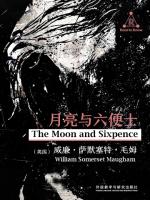生命之河流
"The world is hard and cruel. We are here none knows why, and we go none knows whither. We must be very humble. We must see the beauty of queitness. We must go through life so inconspicuously that Fate does not notice us. And let us seek the love of simple, ignorant people. Their ignorance is better than all our knowledge. Let us be silent, content in our little corner, meek and gentle like them. That is the wisdom of life."
It is what Dirk Stroeve said when the death of Blanche Stroeve came upon him. At that moment, I think I got an inspiration of the feature of this book: a risky life or a steady one, a tortured, dynamic life or a peaceful smooth one. Every character in this book is giving his/her own answer, when they need to take action, about marriage and about dream.
I ’ve read 70% of the book, which this report will be based on.
Mrs. Strickland sees things quite clearly. She is one of those ‘smart’ person: she loves literature but never strives to be a writer. Instead, she married a rich husband and invites writers so that she could enjoy their accompany. Strickland left her, she said “But if he hasn't gone because he's in love, then it's finished..I hate him. I'll never forgive him now.” I think she knows the weight of dream for Strickland, she’s irritated by Strickland because they are not the same kind of people.
Dirk Stroeve relies on his sensitivity to emotion to interact with the world, overly kind-hearted and passionate that others treat him as a fool. He has the instinct of caring and love, and gains power from it. When he experienced the betrayal and suicide of Blanche, that fire in his heart was totally put up. His life river was no longer lively, and returned to a meek, quiet state.
Blanche Stroeve may seem an unbalanced, cold-blooded person who gave up herself for her imaginary love of Strickland. But also take into consideration that she and Dirk have had a harmonious marriage in which she played the role of a mild, considerate wife. I think she knows the consequence of going away with Strickland, which means there will be no house, no steady life, no Dirk treating her as a goddess. Anyway, she left. To some extent, she is like Strickland, with desires echoing in her soul, making a choice which cannot be understand by the world.
Charles Strickland, the most dramatic character of the book, for realizing him better, should not be measured with the ruler of worldly routine, where everyone behaves under social norms. Strickland, however, is dominated and powered by his internal impulsion and conflict, something like an irresistible instinct.
“-I want to paint.
-But you're forty.
-That's waht made me think it was high time to begin.”
“-I've got to paint.
-You blasted fool.
-I don't see why, unless it's fool to say the obvious.”
His word touches me. Painting as to him, is just like “We hold these truths to be self-evident” in The Declaration of Independence. Really, for all of us there is something that we have innate interest and passion with, that we think our love is obvious, self-evident, but we are struggling to find the most assuring reason from the outside world of whether to pursue it. Strickland is remembered by readers because he follows his inner heart, wildly disparaging social norms, which correlates to our most obscurest wish to break out of social restraints.
“All over the place was six pence, but he looked up at the moon.”



 京公网安备 11010802032529号
京公网安备 11010802032529号